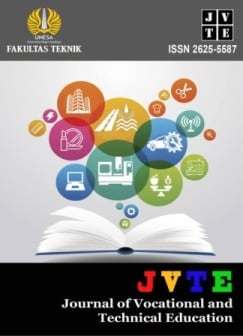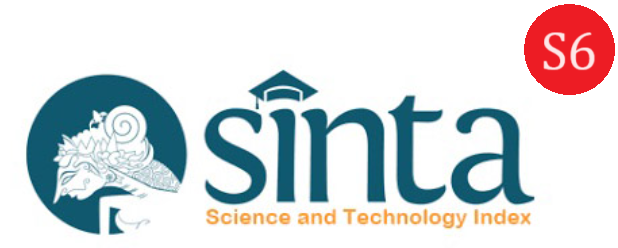PENGARUH PRAKTIK KERJA INDUSTRI TERHADAP PEMBENTUKAN KARAKTER MAHASISWA TEKNIK INFORMATIKA UNIVERSITAS NEGERI SURABAYA
DOI:
https://doi.org/10.26740/jvte.v2n1.p30-36Abstract
ABSTRAK
Praktik kerja industri (Prakerin) merupakan model yang diterapkan oleh Teknik Informatika, sebagai salah satu program studi di Unesa, untuk memberikan kecakapan tertentu kepada mahasiswa. Prakerin adalah pola penyelenggaraan diklat yang dikelola bersama-sama antara Prodi dengan industri/asosiasi profesi sebagai institusi pasangan, mulai dari tahap perencanaan, pelaksanaan hingga evaluasi dan sertifikasi. Prakerin dilaksanakan selama 1-3 bulan di dunia usaha/dunia industri. Selama ini, kegiatan Prakerin tidak pernah dimanfaatkan untuk menganalisis softskill yang dimiliki mahasiswa setelah melakukan Prakerin. Padahal, softskill sangat dibutuhkan oleh mahasiswa setelah lulus. Oleh karena itu, penelitian ini bertujuan menganalisis dan mensintesis dampak praktik kerja industri terhadap karakter mahasiswa Jurusan Teknik Informatika yang sesuai dengan motto Unesa œgrowing with character. Jenis penelitian yang digunakan adalah penelitian kuantitatif dengan menggunakan kuesioner skala Likert untuk mengumpulkan data. Kemudian data dianalisis menggunakan statistik deskriptif. Hasil pengolahan data diperoleh kesimpulan bahwa mahasiswa Jurusan Teknik Informatika melakukan Prakerin dengan baik dan karakter mahasiswa Jurusan Teknik Informatika menjadi lebih baik setelah melakukan Prakerin dibandingkan sebelum melakukan Prakerin dalam hal disiplin dalam beribadah, mandiri, jujur, peduli, dan tangguh.
Kata Kunci: karakter, pendidikan vokasi, praktik kerja industry.
ABSTRACT
Industrial work practice is a model applied by Informatics Department, as one of the study programs at Unesa, to provide certain skills for students. Industrial work practice work training that is managed jointly between Study Programs and industry / professional associations as a partner, starting from planning, implementation to evaluation and certification. Internship is carried out for 1-3 months in the business / industrial world. During this time, internship activities have never been used to analyze the soft skills required by students after internship. In fact, soft skills are really needed by students after graduation. The purpose of this study is to analyze and synthesize industrial work practices on the character of Informatics Engineering students in accordance with Unesa's motto "developing with character". This type of research is a quantitative study using a Likert scale questionnaire to collect data. Then the data were analyzed using descriptive statistics. Results shown that students of the Department of Informatics performed the internship well and their characters improved in terms of discipline in worship, independent, honest, caring, and tough.
Keywords: character, industrial work practice, vocational education.
References
[1] Yoto. (2017). Preparing Skilled Labor in Industry Through Production-Based Curriculum Approach In Vocational High School. In Green Construction and Engineering Education for Sustainable Future (pp. 020002-1-020002-6).
[2] Villy, E. P., Prantiasih, A., & Atok, A. R. Al. (2013). Pendidikan Karakter Dalam Pelaksanaan Praktik Kerja Industri Siswa Smk Negeri 1 Pungging Di PT. Sinar Sosro Kab Mojokerto. Jurnal Pendidikan Kewarganegaraan, 2(1).
[3] Samsudi, Sunyoto, & Widodo, J. (2015). Development Management Model of Industrial Work Practice at Vocational High School Based Entrepreneurship. In The Twelfth International Conference on eLearning for Knowledge-Based Society (p. 6.1-6.5).
[4] Septiana, E. N., Fathoni, A., & Minarsih, M. M. (2016). Pengaruh Magang Kerja, Minat dan Orientasi, Spesialisasi Keahlian Terhadap Kesiapan Kerja Siswa. Journal Of Management, 2(2).
[5] Arfandi, A., & Sampebua, O. (2017). Kesiapan Pelaksanaan Praktik Kerja Industri Program Studi Keahlian Teknik Bangunan di Kota Makassar. Cakrawala Pendidikan, XXXV(1), 8087.
[6] Hasbullah, & Azmi, M. F. (2018). Pengembangan Model Pembelajaran Bahasa Inggris Dalam Me-nanamkan Karakter Siswa Kelas X SMK Negeri 1 Labuapi. Tirai Edukasi, 1(1), 114.
[7] Shahid, I. M., Sastromiharjo, A., & Anshori, D. S. (2018). Pengaruh Pendidikan Karakter Berbasis Leasson Study. In INTERNATIONAL CONFERENCE ON EDUCATION LANGUAGE AND LITERATURE (pp. 294302).
[8] Prikshat, V., Nankervis, A., Burgess, J., & Dhakal, S. (2018). The Transition from Graduation to Work. Springer Singapore. https://doi.org/10.1007/978-981-13-0974-8
[9] Bricki, N., & Green, J. (2007). A Guide to Using Qualitative Research Methodology. Medecins Sans Frontieres. https://doi.org/10.1109/PROC.1978.11033
[10] Mack, N., Woodsong, C., McQueen, K. M., Guest, G., & Namey, E. (2011). Qualitative Research Methods: A data collectors field guide. Qualitative Research Methods: A data collectors field guide.
Downloads
Published
How to Cite
Issue
Section
 Abstract views: 901
,
Abstract views: 901
, PDF Downloads: 1052
PDF Downloads: 1052






